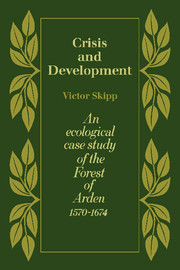Book contents
- Frontmatter
- Contents
- List of figures
- List of tables
- Acknowledgements
- PART ONE THE CONTEXT
- PART TWO THE CASE STUDY
- 4 The demographic crisis of 1613–19
- 5 Negative responses
- 6 The ecological problem
- 7 Positive responses: agrarian change
- 8 Positive responses: new employment openings
- 9 Model of demographic, economic and social developments, 1575–1649
- 10 The new ecological regime, 1625–74
- 11 The social cost
- PART THREE IMPLICATIONS
- Appendix 1 The practice of birth control
- Appendix II Estimates of population size
- Notes
- Index
8 - Positive responses: new employment openings
Published online by Cambridge University Press: 05 November 2011
- Frontmatter
- Contents
- List of figures
- List of tables
- Acknowledgements
- PART ONE THE CONTEXT
- PART TWO THE CASE STUDY
- 4 The demographic crisis of 1613–19
- 5 Negative responses
- 6 The ecological problem
- 7 Positive responses: agrarian change
- 8 Positive responses: new employment openings
- 9 Model of demographic, economic and social developments, 1575–1649
- 10 The new ecological regime, 1625–74
- 11 The social cost
- PART THREE IMPLICATIONS
- Appendix 1 The practice of birth control
- Appendix II Estimates of population size
- Notes
- Index
Summary
A peasant with 10 or 15 acres of land can manage without buying provisions; and, apart from finding his rent, he can also manage – at a pinch, and for a time – without money. Such a man, therefore, does not need employment. But the landless cottager, since he cannot produce his own food, must be able to produce money; which means that, poor relief aside, he cannot support himself and his family without getting work. In the 1610s it is possible that many landless cottagers found it inordinately difficult to do so.
However, the fact that by the mid seventeenth century the five parishes were managing to accommodate a sizable body of such people implies that, like the food problem, the employment problem – to some extent at least – must eventually have been solved. From the ecological point of view, the provision of these new employment openings may be regarded as a second positive response.
The agrarian changes would themselves have helped to create additional work. Dairying is more labour-intensive than beef production; and so is arable cultivation. ‘There are no two trades’, says Carew, ‘which set so many hands on work at all times of the year as that one of tillage.’ In 1550 a correspondent of William Cecil's wrote ‘owte of the dekaye of tyllage spryngethe ii evylls, skarsyte of korne and the pepull unwroughte’. It follows that from the advance of tillage must have sprung two goods: an increase of corn and an increase of employment.
- Type
- Chapter
- Information
- Crisis and DevelopmentAn Ecological Case Study of the Forest of Arden 1570–1674, pp. 54 - 64Publisher: Cambridge University PressPrint publication year: 1978



